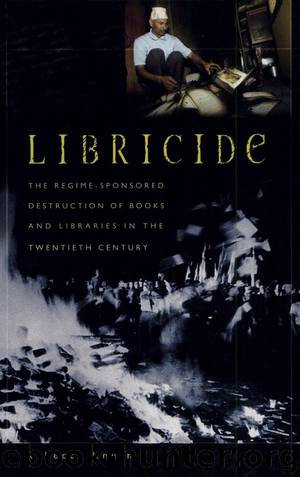Libricide by Rebecca Knuth

Author:Rebecca Knuth
Language: eng
Format: epub
Publisher: Praeger
The Serbs were interested in destroying items that, simply by existing, confirmed the history of Muslim residency in Bosnia. Typifying Bosnia's Muslims as converted Serbs, and thus traitors against Serbdom, the Serbs were unwilling to admit that the majority of Bosnians—the Bosnjaks— had been Muslim by faith since the middle of the fifteenth century (Balic 1993). Their ancestors had lived in the independent Kingdom of Bosnia (1377-1463), which predated the Ottoman and Austro-Hungarian conquests. Within destroyed libraries, archives, museums, and mosques were handwritten accession registers and plat books from Ottoman times that demonstrated that Slavs professing Islam had lived in Bosnia for centuries. It was necessary to destroy documents demonstrating the validity of Muslim historical claims to Bosnia because they directly contradicted the Serbian expansionist claim that Bosnia had no legitimacy as a separate nation or civilization (Ali and Lifschultz 1993).
By shelling Sarajevo's Oriental Institute in 1992, the Serbs destroyed the largest collection of Islamic and Jewish manuscripts and Ottoman documents in Southeast Europe—primary sources documenting five centuries of Bosnia's history (Riedlmayer 1995). Losses included the Manuscripta Turcica, with more than 7,000 documents from the 1600-1800s, judicial documents, and deeds from nearly all districts of Bosnia in the 1800s (Zeco 1996). There were more than 5,000 oriental manuscripts, the eldest dating from the eleventh century. The institution was a major research center for Balkan studies. It had published its own magazine, catalogs, translations of the Koran, and an Arabic dictionary. By destroying this and other libraries, the Serbs were perpetrating the ultimate act of denigration of Turk or Ottoman civilization: eliminating all evidence of Muslim contributions to the development of culture (Balic 1993). The Serbs were chipping away at the very identity of Muslims from all angles: "An estimated 481,000 linear meters of record—the equivalent of a row of document storage boxes more than 300 miles long—were destroyed in attacks on historical archives and local registry offices during the 1992-95 war. Lost in the flames were hundreds of thousands of documents reording people's births, deaths, and marriages, their properties and businesses, their cultural and religious lives, civic and political activities and associations" (Riedlmayer 2001, 279). Personal documents were also seized, including passports, driver's licenses, letters, prescriptions, and diplomas. Muslims were forced to turn over property deeds in exchange for safe passage out of the region. In a curious perversion of bureaucracy, Muslims in Banja Luka had to obtain twelve different certificates to get out of the city, including one certifying that they had turned in all their library books. Then, for a fee of $200, they were transferred to the top of a mountain where they could walk to safety through an area controlled by Serbian paramilitaries and quasi-official bandits who robbed, raped, and sometimes executed them (Gutman 1993).
Download
This site does not store any files on its server. We only index and link to content provided by other sites. Please contact the content providers to delete copyright contents if any and email us, we'll remove relevant links or contents immediately.
Cecilia; Or, Memoirs of an Heiress — Volume 1 by Fanny Burney(32558)
The Great Music City by Andrea Baker(32018)
Cecilia; Or, Memoirs of an Heiress — Volume 2 by Fanny Burney(31956)
Cecilia; Or, Memoirs of an Heiress — Volume 3 by Fanny Burney(31940)
We're Going to Need More Wine by Gabrielle Union(19045)
All the Missing Girls by Megan Miranda(16023)
Pimp by Iceberg Slim(14506)
For the Love of Europe by Rick Steves(14121)
Bombshells: Glamour Girls of a Lifetime by Sullivan Steve(14072)
Talking to Strangers by Malcolm Gladwell(13370)
Norse Mythology by Gaiman Neil(13363)
Fifty Shades Freed by E L James(13239)
Mindhunter: Inside the FBI's Elite Serial Crime Unit by John E. Douglas & Mark Olshaker(9339)
Crazy Rich Asians by Kevin Kwan(9290)
The Lost Art of Listening by Michael P. Nichols(7506)
Enlightenment Now: The Case for Reason, Science, Humanism, and Progress by Steven Pinker(7311)
The Four Agreements by Don Miguel Ruiz(6763)
Bad Blood by John Carreyrou(6621)
Weapons of Math Destruction by Cathy O'Neil(6278)
